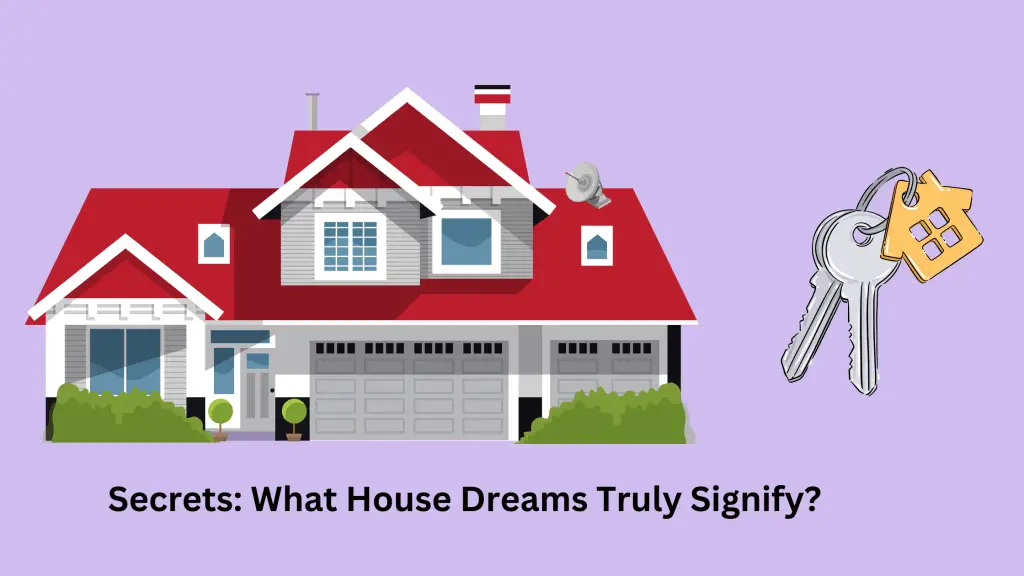Dreams of houses often serve as cryptic gateways into the labyrinth of our subconscious minds.
These enigmatic nocturnal adventures can be like puzzle pieces, offering insights into our deepest desires, fears, and aspirations.
In this exploration, we embark on a quest to unravel the intricate tapestry of house dreams, delving into their symbolic richness with a touch of curiosity and a pinch of introspection.
House dreams, like whispered secrets from our inner selves, frequently mirror our longing for stability, security, and a sense of identity. They manifest as narratives where we purchase or construct houses, often signaling our readiness for change or transformation.
Alternatively, we find ourselves in dreamscape dwellings that have seen better days, echoing unresolved issues or the need to confront our past. These dreamscapes aren’t just bricks and mortar; they are the canvas upon which our subconscious paints intricate stories.
The uniqueness of house dreams lies in the intricate details, akin to a hidden code waiting to be deciphered. A dilapidated house might symbolize the decay of certain aspects of our lives, while a magnificent mansion could signify our loftiest aspirations.
These seemingly mundane nocturnal adventures can have profound impacts. Take, for instance, the renowned author Haruki Murakami, whose creative genius was ignited by a recurring dream of a mysterious house, inspiring his novel “Kafka on the Shore.”
This testament to the transformative power of house dreams underscores their significance in our lives.
So, what exactly are house dreams?
House dreams are more than what meets the sleeping eye. They are portals to our innermost thoughts and feelings, revealing our unspoken desires and hidden anxieties.
Each house we encounter within these dreams represents not just bricks and beams but facets of our identity, our yearning for security, and our role in the world. The dream house becomes a stage where the drama of our life plays out, encompassing relationships, careers, family, and personal growth.
Every nook and cranny of the dream house harbors a secret, waiting to be unearthed. Concealed chambers may point to untapped potential, while peculiar rooms might represent unresolved issues or unexplored opportunities.
To harness the full potential of these dreams, many choose to keep dream journals, documenting each nocturnal sojourn. Others delve into the realms of dream analysis, seeking the wisdom of therapists or the pages of dream interpretation books.
To unlock the profound insights that house dreams offer, one must become an interpreter of symbolism, meticulously connecting the dream to their waking life and emotions.
It’s in the scrutiny of these dreams’ minutiae that we unearth nuggets of wisdom, guiding us towards self-discovery and personal growth. Therefore, the next time you find yourself wandering the corridors of a dream house, seize the opportunity to delve deeper into the recesses of your mind.

Understanding the Significance of House Dreams
House dreams hold a mirror to our subconscious desires, fears, and emotions, reflecting the multifaceted aspects of our lives. The house within these dreams becomes a microcosm of the self, representing the inner world, our emotional state, and the myriad dimensions of our personality.
A dilapidated house may point to unresolved traumas or neglected emotions, while a well-maintained abode can signify inner harmony and self-care.
Moreover, the location of the dream house carries its own significance. A familiar neighborhood may evoke feelings of security and belonging, while an unfamiliar locale could signal a yearning for adventure or a desire to explore uncharted territories within ourselves.
The presence or absence of people within the dream house further adds depth to the narrative, offering clues about our relationships and social interactions.
Yet, the true essence of these dreams lies not only in the external symbolism but also in the emotions they evoke. Positive emotions like joy or comfort may signify fulfillment in our waking lives, while negative ones like fear or anxiety may unveil hidden fears or unresolved conflicts.
To glean the most from these dreams, we can employ various practices, from maintaining a dream journal to seeking the counsel of therapists or dream analysts.
Dreaming of a New House: A Path to Personal Transformation
Dreaming of a new house often symbolizes our pursuit of independence and the need for personal space. It’s a dream that speaks to our longing for a safe haven where our true selves can flourish. This nocturnal narrative may also signify progress and advancement in various aspects of our lives.
The interpretation of this dream is deeply personal, influenced by individual experiences and circumstances. The condition, size, location, or appearance of the dream house all play a role in shaping its meaning.
It serves as an invitation to reflect on our current situation, encouraging us to contemplate the changes we wish to make. Whether it’s taking risks, prioritizing self-care, or embracing new beginnings, this dream urges us to take action and build the life we envision.
Dreaming of an Old House: Exploring the Past for Insights
Dreaming of an old house invites us to embark on a journey of self-exploration. An old house in our dreams often symbolizes unresolved issues from the past, a desire for security, or a longing for change. It can also serve as a reflection of our feelings about aging and mortality.
Consider the story of Sarah, who found herself revisiting an old house from her childhood in her dreams.
As she ventured through the rooms filled with memories, she recognized that the house wasn’t just about her past but also her fear of moving forward. Seeking professional guidance, Sarah confronted her emotions, found clarity, and embraced change.
Dreaming of an old house is a poignant reminder of the profound insights hidden within our subconscious minds. Each dream is a unique and deeply personal narrative, holding the keys to self-discovery and personal growth.
Confronting Our Fears: Dreaming of a Haunted House
Dreaming of a haunted house is akin to receiving a cryptic message from our subconscious, an invitation to confront repressed emotions and unresolved matters. The ghostly figures that haunt the shadows represent those lingering fears and neglected emotions, much like the neglected state of the house itself.
Just as a dilapidated house symbolizes a neglected mental or emotional state, a haunted house serves as a metaphor for the burdens we carry.
This dream encourages us to break free from these emotional shackles and find ways to address our fears and anxieties. It may also signify a deep-seated desire for change or transformation, shedding the elements of our lives that no longer serve us.
Psychological Interpretations of House Dreams: A Glimpse into the Subconscious
Psychological analyses of house dreams reveal the rich tapestry of our subconscious minds.
These interpretations offer valuable insights into our emotions, relationships, and personal growth. By delving into the symbolism and imagery of these dreams, we gain a deeper understanding of ourselves and our lives.
However, the interpretation of these dreams is inherently personal, and influenced by cultural, individual, and psychological factors.
The elements within the dream house, such as its size, condition, and location, mirror different aspects of our lives, including our self-image, relationships, and emotional well-being.
A dilapidated house may signify feelings of neglect or unresolved issues, while a well-maintained house can symbolize stability and security.
The specific rooms within the dream house add further layers of meaning. For instance, a kitchen may represent nourishment and domesticity, while a bedroom may symbolize intimacy and personal relationships.
Exploring these rooms unveils the deeper emotions and desires that shape our waking lives.
To gain a clearer understanding of house dreams, keeping a dream journal can be a valuable practice. Recording these dreams allows us to identify recurring themes and patterns, shedding light on areas of our lives that may require attention or exploration.
Additionally, seeking the guidance of a therapist or dream analyst can provide valuable insights into the hidden messages of these dreams.
Conclusion
In conclusion, house dreams are like enigmatic novels written by our subconscious minds. They offer us a glimpse into the inner workings of our thoughts and emotions, revealing our desires, fears, and aspirations.
Each dream house is a reflection of our identity, our need for security, and our place in the world. To unlock their profound insights, we must become diligent interpreters of symbolism, connecting these dreams to our waking lives. Through this introspective journey, we unearth the treasures of self-discovery and personal growth that house dreams have to offer, one dream at a time.







